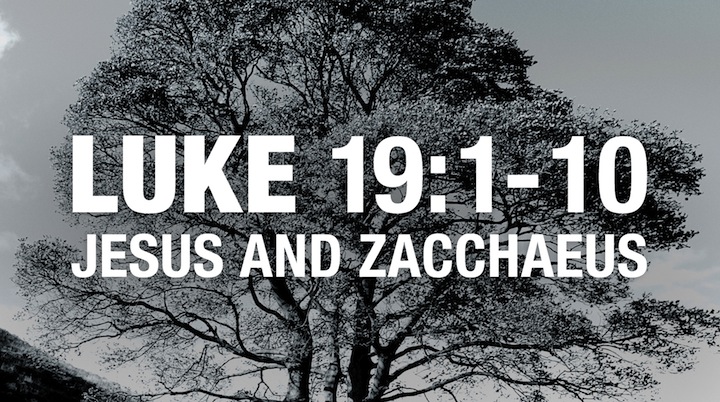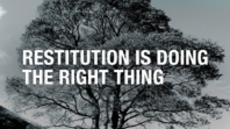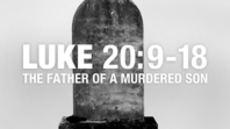
Can’t see the video? Download and install Flash to be able to view. Get Flash Here
Zacchaeus was not just a wee little man, he was a man idolizing money and power and taking advantage of his neighbors. But when Jesus calls out to Zacchaeus, his life is changed forever. Zacchaeus immediately repents and offers restitution to anyone he’s wronged, which results in much rejoicing.
19:1 He entered Jericho and was passing through. 2 And there was a man named Zacchaeus. He was a chief tax collector and was rich. 3 And he was seeking to see who Jesus was, but on account of the crowd he could not, because he was small of stature. 4 So he ran on ahead and climbed up into a sycamore tree to see him, for he was about to pass that way. 5 And when Jesus came to the place, he looked up and said to him, “Zacchaeus, hurry and come down, for I must stay at your house today.” 6 So he hurried and came down and received him joyfully. 7 And when they saw it, they all grumbled, “He has gone in to be the guest of a man who is a sinner.” 8 And Zacchaeus stood and said to the Lord, “Behold, Lord, the half of my goods I give to the poor. And if I have defrauded anyone of anything, I restore it fourfold.” 9 And Jesus said to him, “Today salvation has come to this house, since he also is a son of Abraham. 10 For the Son of Man came to seek and to save the lost.”
The Holy Bible, English Standard Version copyright © 2001 by Crossway Bibles, a publishing ministry of Good News Publishers. Used by permission. All rights reserved. Quotation information.
1 He entered Jericho and was passing through. 2 And there was a man named Zacchaeus. He was a chief tax collector and was rich. 3 And he was seeking to see who Jesus was, but on account of the crowd he could not, because he was small of stature. 4 So he ran on ahead and climbed up into a sycamore tree to see him, for he was about to pass that way. 5 And when Jesus came to the place, he looked up and said to him, “Zacchaeus, hurry and come down, for I must stay at your house today.” 6 So he hurried and came down and received him joyfully. 7 And when they saw it, they all grumbled, “He has gone in to be the guest of a man who is a sinner.” 8 And Zacchaeus stood and said to the Lord, “Behold, Lord, the half of my goods I give to the poor. And if I have defrauded anyone of anything, I restore it fourfold.” 9 And Jesus said to him, “Today salvation has come to this house, since he also is a son of Abraham. 10 For the Son of Man came to seek and to save the lost.”
People in general, but men in particular, are prone to worship money and power. Money and power. Right, men? If you had to vote, would you want money or no money? Money. Power or no power? Yeah, no need to take a vote. It’s unanimous. People in general, but men in particular, when given the option, prefer money and power.
Oftentimes what’s motivating that is an underlying idol: we want control, we want an identity of success, we want status, we want comfort, we want security, we want people to fear us. Money and power can contribute to the achieving of those pursuits. And what happens is that some men and women achieve that objective. They receive, over the course of time, money and power. And what happens is it’s not always pretty. You may be well known, but not well loved. You may be very rich, but not very generous. People may fear you, but not really know you. And people talk about you, but they don’t really have a relationship with you.
This happens in every generation. Every generation has some of the most note-worthy and notorious examples of people who worshiped money and power and how it did not end well for them. Perhaps our generation’s most tragic example is Bernie Madoff. You know the story, the greatest Ponzi scheme perhaps in the history of the world, where he reportedly, allegedly billed people out of billions of dollars. And it was set up to where there were people who would lose their money, and the money would essentially come to the top of the pyramid scheme. And at the top was Bernie Madoff.
Well, there’s a guy like that in the Bible. He was a crook and a thief of a different sort with his own kind of Ponzi scheme. He ripped people off and he was very rich and very powerful. And his name is Zacchaeus. And today you’re going to see him meet Jesus and how his life changes with his relationship beginning with Jesus Christ. Today we just wanna thank Luke—actually, the story of Zacchaeus is only found in the Gospel of Luke. So had Luke not faithfully recorded this by the power of the Holy Spirit for us, we wouldn’t know the story of Zacchaeus. Some of you are familiar with this story. Others of you, perhaps, are not.
We’ll launch in, Luke 19, we learn about Jesus and Zacchaeus. The first thing we learn is that Zacchaeus was a wee, rich man. He was a little guy. Luke 19:1–4, “He,” that is Jesus, “entered Jericho,” that’s a town he’s passing through on his way to Jerusalem where he’s gonna die on the cross in our place for our sins. “He entered Jericho and was passing through. And there was a man named Zacchaeus. He was a chief tax collector and was rich. And he was seeking to see who Jesus was, but on account of the crowd he could not” see, because he was a wee little man. “So he ran on ahead and climbed up into a sycamore tree to see him, for he,” that being Jesus, “was about to pass by.”
So here’s the story: Zacchaeus, we learn of him as being both wealthy and powerful. He’s not just a tax collector, he’s the chief tax collector. So, again, in this Ponzi scheme that the Roman government has set up, and the Roman government at this point had overtaken God’s people and they were ruling over them. And so then they would take some of those who were Jewish, they would appoint them to be tax collectors. These were traitors. We would put them today in the same category as pimps and those who are in sex trafficking and drug dealers. This is the worst of the worst. These are people who betrayed their own nation, they betrayed their own God, and they betrayed their own family to become tax collectors.
The way this Ponzi scheme worked, you would collect money for the godless Roman government, and anything you could extort beyond that was yours. So your job was extortion. And you would have to pay a percentage up the pyramid to the guy at the top, the head of the Ponzi scheme. Who is it? Zacchaeus. He’s not just a tax collector, he’s the chief tax collector. He’s a very powerful man. He’s bankrupted people, he’s defaulted on loans, and he has seized people’s possessions.
Today he would be the kind of guy who’s very rich, that’s what the Bible says. He’s very rich. He is loaded. Multimillionaire. Billionaire. This is a guy with private jets, vacation homes, a staff to serve him, only eats the finest of foods, only drinks the finest of wines, and he lives the life of a god. He is essentially worshiped by people. And nonetheless, he’s seizing homes and assets and cars and bankrupting people and taking their retirement account and taking their children’s college fund and he is ripping people off. That’s who he is.
Now let me say this: sometimes actions are legal and sinful. What Zacchaeus is doing is not illegal, but it is sinful. It is acceptable in the eyes of the government, but it is unacceptable in the sight of God.
And this is important because you and I need to know that we are to submit to the government, Romans 13. But beyond that there are the laws of God. And the laws of God will say that things are sinful that are, in fact, legal. Adultery, it’s not illegal. Sinful. Gossip is not illegal, it’s sinful. Coveting is not illegal, it’s sinful.
Therefore, let’s say, for example, you have a child, 3-year-old kid, and they are disobeying the Bible. They’re dishonoring their father and mother. They don’t obey, they’re throwing their food at dinner, and they call their dad a booger. Alright, they’re just horrible, small people. As a parent you cannot pick up the phone, dial 9-1-1, “Hello, 9-1-1, what is it?” “My child is violating one of the Ten Commandments. They are dishonoring their father and mother. We heard the ‘b’ word. They called us a booger. You need to send out an officer with a Taser immediately. We need to Taser the 3-year-old.” They will say, “This is not an emergency.” Because it’s not illegal, it’s just sinful.
And sometimes you and I, we get away with things in the eyes of the government that we don’t get away with in the eyes of God. And so we need to take our morality beyond the law, to the law of God. And here, what Zacchaeus is doing is not illegal, but it’s sinful. You couldn’t call the police on him, but God is going to deal with him, and here he is, Jesus Christ. This is very important to recognize. Sometimes what is legal is simultaneously sinful.
Now here’s what we know about this man: he’s very rich, he’s very powerful, and he’s very little. I see Danny DeVito. I just do. Maybe Woody Allen. He’s a little guy. I don’t think Jeff Bezos is that big, maybe he’s like a Jeff Bezos, Amazon.com—he’s a little, rich man. You see him? I need you to get a picture of him. And here comes Jesus.
He really wants to see Jesus. So he does two things that are not supposed to be done by a man in that day or a man in this day. Number one, he runs. And men don’t run, right? Unless we wanna get fit, we stole something, or there’s a dog involved, right? Those are the three exception clauses in the male behavioral contract by which you can run. This is athletic, defense, or thievery. Those are the clauses by which a man can run. But a businessman does not run, right? He was wearing, probably, a robe. But in our day, it’d be a guy in a really nice suit.
And Jesus is coming and he wants to see Jesus, but he’s such a wee little man he can’t see him, so he runs ahead and not only does he run, number two, he climbs a tree. Now, how many of you growing up as a kid, you heard this story, and it’s a pretty awesome story because just the thought of Danny DeVito climbing a tree is fantastic, right? I mean, it’s just fantastic. So it would be like there’s a famous person come to town and he’s traveling with an entourage and there’s a large crowd. And you’re walking along trying to look at him, you look up in a tree and there’s Bill Gates in a suit, up in a tree. That’s fantastic.
That’s exactly what happens here with Zacchaeus. He does what a respectable, dignified businessman would not do: he runs and he climbs a tree ‘cause he’s a wee little man. And then as Jesus passes by, the question is, well, what is Jesus gonna do with Zacchaeus? How will he respond? What will he do? And it’s funny because Zacchaeus’ name literally means “the righteous one.” So if your name’s Zac, like my son Zac, your name means “the righteous one.” And everybody would’ve thought, “that’s not true.” That’s like calling Charlie Sheen “the sober one.” It’s like, really? Really? And so, his name betrays his character, but we’re gonna see Jesus change everything, and by grace through faith, make him a righteous man.
So you gotta see him. You see him, Zacchaeus up in the tree? I think a short, chubby, older, perhaps balding, well-dressed, rich man, who maybe got a boost from all of his bodyguards up into the tree, right? So you gotta see him. There he is. Now Jesus comes by. Luke 19:5, Jesus called Zacchaeus. “And when Jesus came to the place, he looked up and said to him, ‘Zacchaeus, hurry and come down, for I must stay at your house today.’” There’s a sense of urgency. So Jesus looks up in the tree and it’s kind of this funny moment, this huge crowd is around following Jesus as he’s passing through Jericho, on his way to Jerusalem, during the feast of Passover, where he’s ultimately gonna be crucified, die and rise in our place for our sins as our Savior. He looks up in the tree and there’s Zacchaeus.
And here’s what he does, friends. He calls Zacchaeus by name. That’s really important. We don’t know how he knew Zacchaeus’ name. Maybe the Holy Spirit revealed that to him, I don’t know. Maybe Zacchaeus was so notorious that everybody kind of knew who he was. We don’t know. But Jesus sees him, calls out, “Zacchaeus!”
Friends, Jesus always, always does this. He’s always calling people out by name. When I was 19 years of age, he called for me, “Mark.” And the Holy Spirit changed by heart, changed my life, I became a Christian. Those of you who are Christian, Jesus called you. He called you by name. Yes, there are billions of people on the earth, but the Bible says he knows your name, every day of your life, and every hair on your head. For some of you, it’s not a lot of work. But he knows them all. He knows those things.
And Jesus still calls by name. And if you’re here today and you’re not a Christian, let me say this: Perhaps Jesus is calling you by name. He’s calling you unto himself. He’s calling you to know him. And when Jesus calls Zacchaeus, he calls him to a friendship. And he does it openly and publicly. He says, “Zacchaeus, I’m going to your house.”
Now this may seem rude at first, Jesus invites himself over with his disciples, so it’s gonna be a big event. “Hey, the thirteen of us are coming to your house. We like to eat.” I mean, “Fix us something to eat.” And here’s what Jesus is doing: Jesus is telling Zacchaeus, “I want to be your friend.” Because going to someone’s home and having a meal with them, in that culture, as ours, that’s an act of friendship. How many people do you think had gone to Zacchaeus’ house for dinner? Not a lot. He eats well alone.
Furthermore, Jesus does this in front of the crowd. Those who would have been friends with Zacchaeus, had spent time at his home and perhaps eaten a meal with him, they wouldn’t put this on their Facebook wall, right? “Going to Zacchaeus’ house for dinner tonight,” ‘cause the trolls would just go crazy. It’s not a very popular thing to be friends with Zacchaeus, so if you are friends with Zacchaeus you don’t really tell anyone. And Jesus is telling everyone, “Zacchaeus is as of this moment my friend. I’m going to his house. We’re gonna eat a meal together. I love Zacchaeus.” That’s amazing, isn’t it?
This is what Jesus does for sinners. He calls us by name, he invites us to a friendship. John 15, Jesus says he’s our friend. Don’t overlook this. Jesus is Lord, God, Savior, King, Sovereign, Christ, and friend. He’s not just a theological position we adhere to—he’s a person we get to know. Jesus is alive and he wants to eat with you, he wants to speak with you, he wants to help you. Jesus is a friend. He’s God and our friend. Isn’t that amazing? That God would become a man, and that he would invite his enemies to be his friends and be willing to eat with us and to spend time with us and through the presence and the power of the Holy Spirit to never leave us nor forsake us. And that’s exactly what’s happening here for Zacchaeus.
Now, there are two responses, and the question to you is this: What would your response have been? Jesus looks at Zacchaeus, “Zacchaeus, today, come down from the tree right now. I wanna be your friend. Let’s eat together.”
Here are the two responses: Zacchaeus and the crowd. Luke 19:6, “So he hurried and came down and received him joyfully. And when they saw it, they all grumbled, ‘He has gone in to be the guest of a man who is a sinner.’” Two responses. Zacchaeus’ response: “Yes, Jesus! I’d love to be your friend! You wanna eat with me? Let’s go right now.” Zacchaeus is really glad that Jesus cares for him. And so he receives the love, the grace, and the mercy of Jesus Christ. He’s not just undeserving, he’s ill-deserving, as we are, as I am. That’s his response.
The crowd, not really joyful. They’re not all Tweeting, “Yay! Zacchaeus got saved! We’re so excited!” They are grumbling. This means they’re talking about Zacchaeus, but not to Zacchaeus. They’re talking about Jesus, but not to Jesus. They’re gossiping and grumbling. Some of you will call this prayer. So in your Community Group or your friendships, you’ll be like, “So and so’s a such and such. Pray for them.” Well, have you talked to them? “No.” Okay, then you’re in sin because you’re grumbling and gossiping. So they don’t walk up to Jesus and say, “We disagree with your leadership.” They don’t walk up to Zacchaeus and say, “We don’t think you should be the one to have lunch with Jesus.” They say that amongst themselves.
And friends, let me say this: this is common whenever God’s grace is poured out. People grumble. Sometimes everyone’s questioning the leadership of a church, a ministry, and organization. “Should they make that decision?” “Should they love those people?” “Should they be that kind and that accommodating?” “That’s just not acceptable.”
What do they say? “He’s a sinner!” Do you understand those smug, religious, underpinnings here? What they’re saying is, “We’re better than he is.” That’s what they’re saying. “Well, of course God loves us, we’re pretty loveable.” And “Of course God could forgive us, our sins aren’t that bad. But Zacchaeus?”
Who, if God saved and forgave them, would cause you to grumble? The person who abused you, ripped you off, harmed you, betrayed you, cheated on you, divorced you, hit you, lied about you, or fired you? Who would it be that if God loved and saved them you would be grumbling? “That just really frustrates me. So what? They just get forgiven? It’s just fine and now it’s all over?” They grumble. They grumble.
And the key, friends, is to know this: in the sight of God, we’re all guilty. And that God would call any of us and love any of us and forgive any of us, well that’s a miracle. And at any point that we struggle for God to love, seek, save, serve someone, we are saying, “I deserve salvation, they do not.” And we have missed the gospel of grace altogether. Altogether.
We wanna be a people who rejoice when anyone responds to the invitation from Jesus to be friends with him and have their sin forgiven. And some of you are here today and you may be wondering, “Could Jesus really call me to be a Christian and his friend?” Some of you are keenly aware of the things you’ve done and failed to do and the way you’ve lived and how really in the sight of God it is dishonoring. Even if it’s not illegal, it’s sinful. And some of you have that which is also illegal. And from Zacchaeus we get so much hope and encouragement. It doesn’t matter who you are, it doesn’t matter what you’ve done. Jesus calls out to you and he will welcome you as a friend and he will forgive you of any and all sin. That’s exactly what he does for Zacchaeus, that’s what he does for me, that’s what he does for all who are Christian.
But here’s the underlying problem with those who are grumbling. They are thinking that of all that’s going to happen now, Jesus is going to forgive him, and all of the evil, atrocity, and injustice that he’s done will just be swept away and there will not be any justice brought.
So, here’s the key. Here’s what happens with Zacchaeus. It’s a little equation: repentance plus restitution equals rejoicing. Luke 19:8–10, “And Zacchaeus stood and said to the Lord, ‘Behold,’” what does he call Jesus? “Lord,” so he’s become a Christian now. Jesus is his Lord. “‘The half of my goods I give to the poor. And if I’ve defrauded anyone of anything, I restore it fourfold.’ And Jesus said to him, ‘Today salvation has come to this house, since he also is a son of Abraham,’” that is, by faith. “‘For the Son of Man came to seek and to save the lost.’”
Now here’s what happens. Zacchaeus is guilty. He’s guilty. And Jesus forgives him. And those who are present grumble, “That’s not fair.” Now the truth is this: Jesus not only forgives people, he changes them. Religious people don’t get that. “How could he just forgive them?” Well, he’s also going to change them.
So here Zacchaeus indicates that he’s come to saving faith in Jesus Christ. He calls him his Lord. And in that day, when you were under the leadership of the Roman government, you were to say, “Caesar is lord. He’s the highest authority in my life.” And he here says, “No, Caesar is no longer my lord. Jesus is my Lord.” The shortest doctrinal statement in the Bible, “Jesus is Lord.” Above all people, above all kings, above all kingdoms, Jesus Christ above all. Our Creator God, our Savior, and our friend. So he looks at Jesus, he says, “Lord.” This indicates that something has changed in his heart and in his allegiance. He now serves Jesus. He now belongs to Jesus. He now knows Jesus. He now loves Jesus. Above all.
Jesus forgives him and that changes him. See, Christianity is not “do whatever you want, God will forgive you, keep doing whatever you want, and God will keep forgiving you.” Christianity is you do what you want, you meet Jesus, you realize it’s sinful and wicked, you realize that he, in fact, is Lord. You don’t want to continue sinning because something happens deep in you—you change.
The Bible calls it being born again. You become a new person. You now have a new power through the Holy Spirit. You now have a new Lord in Jesus. You now have a new authority in Scripture. And you now have a new nature that has new desires. You don’t wanna keep living the way you used to. You want to change. You want to be different. You want to be like Jesus.
Not so that he’ll love you, but because he already has.
Not so that he’ll forgive you, but because he already does.
Not so that God would be pleased with you, but because Jesus has already called you a friend.
And so the result of this is not religion, it’s rejoicing. And so he here repents; he publicly, in front of a crowd, acknowledges, “Yes, I have sinned. I have sinned.” Repentance, there’s a constellation of words in the Bible, Old and New Testament that speak of repentance, but they all essentially communicate the same big idea. There is Jesus and sin. And you can only go one direction at one time. And so sin is when we turn our back on Jesus, we walk toward our sin. For him it was money and power. Repentance is where we have a change of mind and a change of heart and a change of desire by the presence and the power of the Holy Spirit, we become born again spiritually, and we literally repent. It’s a turning. We turn our back on our sin and we turn our face toward Jesus and we begin walking with him. In its simplest understanding, that’s repentance. Back on Jesus, face toward sin, turn around, back on sin, face toward Jesus. He here repents.
And it culminates in restitution. He has sins of omission: he’s not helped the poor. He has sins of commission: he has defrauded others. That’s exactly what he says. And immediately as a brand-new person he does something he’s never done: he publicly confesses his sin, he publicly practices repentance, and he also guarantees restitution.
Now let me say what restitution is not. Restitution is not penance. Penance is the false teaching that you have done something and you need to pay God and others back so that you can be forgiven. That’s not true. It’s not karma or reincarnation where you gotta pay off the debt so that you can be forgiven. This has actually nothing to do with being forgiven in the sight of God. This is evidence that you’ve received God’s forgiveness.
Let me say it this way: God forgives you, but what if you’ve really harmed other people? Your new nature, your new heart as a new person should be to do all you can to right your wrongs, to help those you’ve harmed, to pay back those you’ve ripped off. Not so that you would be acceptable in the sight of God, but because Jesus has called you a friend and you wanna be a friend to others as he’s been a friend to you. That’s restitution.
And very few evangelical Christians understand restitution. It’s not works, again, it’s not karma, again, it is not penance. It’s justice. It’s doing the right thing. It’s doing the right thing. And so he says, “For my sins of omission, not helping the poor, I’m going to give half of all my assets.” That’s a lot. That’s a 50 percent tithe. That’s a lot, right? Even if he’s a multimillionaire or a billionaire, this is a lot.
And he says, “Now, regarding those I have defrauded …” He’s essentially saying, “You’re welcome to meet with me. Tell me how I’ve ripped you off or what of my employees has,” and he has many, “and I will pay you back.” How much? “Fourfold.” Is that restitution? Yeah. This is like a friend of yours borrows your Hyundai forever, right? You’re like, “They never brought my Hyundai back.” For some, maybe that’s a blessing, but for most it would be a curse. You say, “I lent them my car and they stole it!” Then you get a text, “Hey, I met Jesus, I feel terrible about stealing your Hyundai, so I parked my BMW in your driveway. The keys are under the mat. Please forgive me.” Yay Team Jesus! Right?
That’s what’s happening here. See, Zacchaeus comes down and he has a party at his house and Jesus and the disciples come over and they’re rejoicing. And in making this statement publicly, would you anticipate that others would be rejoicing, too? “Sweetheart, you remember Zacchaeus?” “Yeah, the guy who ripped us off and he took all the money out of our kids’ college account.” “He got saved. He said he’s gonna give us four times more.” “Really? Well, that’s, that’s amazing.” There was just a ripple effect of rejoicing in the community. “What?” And the poor were rejoicing. “Zacchaeus is gonna feed us all! He’s so rich we’re gonna get fat. Yay Team Jesus!”
So it’s not enough to receive the grace of God, we need to be agents of the grace of God. See, it’s not enough to say, “I want Jesus to forgive my sin, but I’m really frustrated when he forgives the sin of someone who’s sinned against me.” Friends, we can’t receive grace without rejoicing when others receive it. And we can’t receive the grace of God without sharing it. So Zacchaeus realizes that God has been generous to me, I need to be generous with others. ’Cause he just met the most generous person in the history of the world, Jesus Christ.
Jesus is generous. What did he just give Zacchaeus? Forgiveness of sin, eternal life, and a new nature. What did Zacchaeus do? Nothing. What did he pay? Nothing. Zacchaeus just got the gift of salvation. And that generosity changed him to become a generous man. See, you need to see Jesus as generous. For God so loved the world he, what? What’s the Bible say? For God so loved the word he gave his only Son that whoever believes him shall not perish, but receive everlasting life.
Our God’s a giver. The greatest gift that’s ever been given is the gift that in this story Jesus is on the way to Jerusalem to give. He’s gonna die in your place, my place, his place for our sins as our substitute, canceling our debt and giving us forgiveness of sin, new nature, new desires, new life, new Lord, new community, new eternity. He’s a giver.
And Zacchaeus just met the Giver of givers. And he knows that his sins are forgiven, but he is immediately practicing the works of discipleship. He’s becoming like his teacher. He’s becoming, by the grace of God, through the power of the Holy Spirit, he’s becoming more like Jesus. “Well, if Jesus is gonna be so generous, I wanna be generous, ‘cause he’s now my Lord.” It’s beautiful, isn’t it?
How do you think the grumbling people felt? Probably a little embarrassed. Don’t grumble when people get saved. Don’t grumble when God is working in their life. Wait and see what he does. Repentance plus restitution equals rejoicing. And this man, he moves very quickly. This is his first day as a Christian and we see immediate work in his heart and in his life.
And now I think it’s noteworthy that this is a rich man. We read earlier in Luke’s Gospel, it’s easier for a camel, fairly large, to go through the eye of needle, particularly small, than for a rich man to enter into the kingdom of heaven. Here Jesus gets a camel through the eye of a needle. He saves a rich man. And this is important because Jesus talks a lot about money, wealth, possessions. Roughly 25 percent of his teaching in the four Gospels, Matthew, Mark, Luke, and John, is about money, wealth, possessions. Because they are an indicator, not the only, but an indicator of the human heart.
And here we see that Jesus really is Zacchaeus’ Lord because he is willing to do away with his false gods, his idols, that he has given his life to and received his identity, comfort, and security from money and power. He’s willing to let them go because Jesus is his Lord. Now, Jesus talks a lot about money, status, wealth, and possessions. And I want you to see that God loves both the rich and the poor, that God saves both the rich and the poor, and that in the kingdom of God and in the church of Jesus Christ, we need both the rich and the poor—that God loves all people and we’re all sinners and we all sin in different ways and we all need to come to the same Savior. And so I don’t care here if you showed up on a skateboard or were dropped off by a limo. Jesus loves you, he calls you by name, he invites you into friendship, he wants you to turn from sin, trust in him, repent, and, as is appropriate, practice restitution.
And this is important to get our theology of finances correct. Because in our day, there are two polar, divided, competitive teachings among Bible preachers and pastors and writers and leaders when it comes to money, wealth, and possessions. One, you’ve heard me say this, but because Jesus keeps talking about money I wanna continually re-emphasize this.
There is a prosperity theology and a poverty theology, and both are very popular and very critical of one another in our day. The prosperity theology says the more you love God, the more he will give you, that Jesus is basically a get-rich-quick scheme. That Christianity is like a stick and Jesus is like a piñata and if you have enough faith you can whack him in the middle and stuff will fall out of the sky to make your life easy.
The opposite of that is a poverty theology, which some are promoting, even some people that I know and love but disagree with on this point. And that is that the less you have, the closer you are to God, that money, wealth, and possessions for the Christian is like kryptonite for Superman. Stay far away.
God does not want us to pursue a prosperity or a poverty theology.
He wants us to be good stewards, whether we have much or little.
He wants us to be generous, whether we have much or little.
He wants us to practice restitution if we have stolen, whether we have much or little.
And he wants us to know that our righteousness is in Jesus Christ, not in riches or in poverty.
There’s a taxonomy that I like to share with you and I’ll share it again because I really want you to think biblically about wealth, money, possessions, credit, and the like. And in our day there are two categories. Those who hold a prosperity theology will read the Bible and pull out all the people who love the Lord and are rich. Those who hold a poverty theology will read the Bible and pull out those who are poor and love the Lord. And the truth is, there’s not two kinds of people, there are four kinds of people, economically speaking, in the Bible. Now, I’ll share them with you. It’s about riches and righteousness.
So first category, there are those who are unrighteous and rich. Would you agree to me that prior to his conversion here in meeting Jesus and responding to his invitation of repentance and friendship, Zacchaeus was both unrighteous and rich? How he got his money: unrighteous. Maybe legal, but sinful. How he used his money, unrighteous. He wasn’t generous to the poor, he didn’t give to God.
Furthermore, he defrauded people. He’s rich, but he’s unrighteous. And he, himself, openly, publicly confesses that. Some of you are like that. You’re rich, but unrighteous. The way you got your wealth and the way you use your wealth, it’s not honoring to the Lord, it’s not helpful to others.
Number two, there are those who are righteous and rich. Zacchaeus, in this act of repentance and restitution, he went from category one to category two, right? He’s still rich, but now he’s acting in a way that is righteous. Through his restitution, “Fifty percent of everything I own goes to the poor. And if I defrauded anyone, I’ll pay them back fourfold.” That is very generous; that’s above the requirements of even the law of God. He becomes, by the grace of God, in an act of repentance and restitution, righteous and rich.
Some of you are like that. Now, he didn’t get his money in a godly way, but some of you have worked hard, you’ve got an inheritance, you’ve invested well, you’re a good steward of your money, the way you receive your money, you’re generous first to your family, which is important, you give to the cause of God, you help the poor, you look for those in need. You’re rich and righteous. God bless you. Don’t feel guilty about being rich, just be a good steward of the wealth that God has given you.
Some of the godliest people I know, quite frankly, are some of the richest. Some of the most bighearted, generous people who are looking for others in need and like to quietly, humbly seek those who are suffering and hurting, and to serve them—because you know what? Money can be a way that we love people. Love can be our words, but it also can be our works, and sometimes it can be our wealth. So love can come in words or works or wealth. And sometimes when we give a gift to somebody, or we help somebody, that’s love. That’s love. Some of the godliest, most loving people I know are righteous and rich.
This is where, quite frankly, I do get tired of the economic discussion in our culture, “Give it to the rich! Give it to the rich! Give it to the rich!” Why? “‘Cause they’re all unholy and the poor people are all holy.” It’s not that simple. It’s not that simple.
Number three, there are some who are righteous and poor. Who, in the story, is both righteous and poor? Jesus. He’s righteous, never sinned, he’s God, and he’s poor. He’s homeless. He’s not homeless ‘cause he won’t work a job. He left his job to go atone for the sin of the world; he had another job to do. It’s not that he’s lazy, it’s not that he was gambling, it’s not that he drank it all away. He didn’t leave it all at the casino. He’s giving it away as a single man without a family to care for, he’s decided to live absolutely minimally on the generosity of others. He is both righteous and poor.
Some of you are like that. You’re poor and righteous. You didn’t sin. You’re not late. You’re college students, you just lost your job, or you’re single mom trying to make ends meet. You’re poor, but we don’t have a rebuke for you. You didn’t sin. You’re just in a hard place.
There are some, however, who are both, category four, unrighteous and poor. We don’t see any in this particular story, but they are in the Bible, particularly in Proverbs. The sluggard who won’t get out of bed in the morning. Alright, the guy who can’t get up by the crack of dinner so he keeps losing a job. That guy. The people who chase get-rich-quick schemes, their whole goal is to retire by the age of thirty or forty, so they leverage everything and the roulette wheel of their life spins and they lose it all. The people who can’t control their substance addiction and they eat and drink and smoke and they get themselves into this position where through drugs and alcohol and the like, they just lose their job, they lose their home, they lose everything.
I’m not saying we shouldn’t help such people, but I’m saying it’s mercy to do so because they’ve shipwrecked their own life and to help them is to treat them as God in Christ has treated us. We shipwrecked our life and Jesus helps us. And when others shipwreck their life, we wanna help them. But it’s not saying that they’re righteous. The guy who won’t work, the Bible says, shouldn’t eat.
Now, I tell you this because, again, over and over and over, Jesus keeps talking about money, status, wealth, and possessions, and some of us think culturally, some of us think politically, some of us think economically. Oftentimes we don’t think biblically.
Which category are you in? Be a good steward, be generous, practice repentance as required, practice restitution so that for you and others there might be rejoicing.
Now, I was curious, was this just a big day for Zacchaeus, or was this a true, heartfelt life change? Was this a day where he got really motivated and Jesus is there and there’s a crowd and the press is there and he’s thinking, “If I say I’m sorry and make a big plea, this could be really helpful. People will like me, I’ll get some friends. I could run for political office. Maybe the believers will embrace me and take me in.”
Did he really change? Or was this just a photo opportunity to write a big check and make the news? So I did a little work and it’s not in the Bible, but in the history of the church, Clement was the bishop of Alexandria, and in a homily, a sermon of his, he says that this man Zacchaeus actually went on to become bishop of Caesarea, possibly appointed by Peter himself.
He really did change, by the grace of God. He went from a thief to a pastor. He ultimately then, it would have required, him quitting his job, walking away from employment at the Roman government, having a complete alteration in his standard of living. Jesus as Lord, he learns the Bible. He learns theology. He learns how to preach and teach. He becomes a pastor, not just a pastor, but a pastor to pastors. This infers, for the rest of his life, he was very generous. He’s still giving to the poor, still giving to the church, still giving to the ministry. He’s still giving to others. This led to a deep, profound change in his life.
Let me say this: don’t timestamp people. Don’t look at someone and say, “That’s who they are and that’s who they’ll always be.” In the grace of God, they could become someone completely different. They could change.
If you’re a Christian, that’s what you’ve experienced. As a Christian, that’s what I’ve experienced. And as Christians, we would say we’re not perfect, but we’re in progress by the grace of God. And who we were is not who we are. And by the grace of God, in the future it is not who we will be. And this man changes. He becomes, insofar as we can tell, a pastor to pastors. Isn’t that amazing? Can you imagine what his testimony was like?
How ‘bout you? How ’bout you? I wanna close with a few questions for you. What does it look like for you? What is your repentance plus restitution that would result in rejoicing? We can’t just look at the story of Zacchaeus and say, “That’s amazing!” We have to look at Zacchaeus and say, “That could be amazing for me, as well.”
So I’m gonna give you some questions to think about personally, to talk about with your family, to discuss in your Community Group: Number one, what have you taken that you need to give back? Have you stolen anything? You can’t say, “Jesus forgives me.” You gotta say, “Jesus forgives me, and I gotta give it back.” Some of you, the people you stole from, they don’t even know. Some of you would say, “It’s not illegal! It was called bankruptcy.” But you intentionally were fraudulent in your dealings with people, if you’re intentionally trying to find a legal way to take money out of someone’s pocket, it may be legal, but it might still be sinful.
What have you taken that you need to repay? See, if this sermon does its job, hundreds of thousands of dollars are gonna come out of Mars Hill Church. Some of you say, “I can’t afford it.” You may need to sell your car. You may need to downsize your lifestyle. You need to make some serious changes as an act of repentance and restitution. And the Holy Spirit for each of you is gonna highlight one of these questions, or more, something that is an action item for you. Yes, Jesus forgives. But what about that which you’ve stolen? Wouldn’t it be good to pay it back?
And let me ask this: if you were in the position of the victim, isn’t that what you would want? If someone called you, said, “I became a Christian! He forgave all my sin! Thanks for letting me rip you off!” You would say, “You know, as the victim, that doesn’t sit quite right.” Now, as the victim, you could say, “I forgive you, as well. The debt is forgiven. I do not want repayment.” You have that right. Or you could say, “Yes, I appreciate that offer, and I will receive it.” See, we want to treat others as we would want to be treated, Jesus says.
Number two, how have you defrauded and what should you pay? I’ll give you an example. Are you the person at work who shows up late, leaves early, in the middle spends a lot of time on Facebook and Twitter, watches a lot of YouTube videos, returns a lot of personal e-mails, takes a lot of personal phone calls? That’s defrauding your employer. You say, “Everybody does it! It’s not illegal!” But it’s sinful. Have you billed clients for hours you didn’t work? Have you padded all of your billing? You’re just like Zacchaeus. You’re just like Zacchaeus.
Who have you defrauded? Who have you defrauded? Are you that person who had that car that was a total piece of garbage, you totally knew it, somebody came to buy it, they saw the fish on the back, they asked you, “How does it run?” You’re like, “Great.” “Alright brother…” “Oh, you know, hey, lemon laws, it’s not illegal.” But were you defrauding? Were you dishonest? You said, “If I tell ‘em it’s a lemon, they’re not gonna buy it.” I know. Maybe you shouldn’t sell it. “But I won’t get my money back.” True, but you also wouldn’t be defrauding someone. Alright, it would be really cool, I think, if we just put, some of us on our vehicles, “This car is a lemon, and so I’m gonna sell it cheap to the glory of God.” At least you know what you’re getting.
How many of you have been defrauded? Somebody sold you something, they didn’t tell the truth. Somebody billed you for something that wasn’t honest. They charged you for something and they padded it. We wanna treat others the way we want to be treated.
Number three, when have you been lazy and what does it look like to change? Have you really not done what you’re supposed to do for your family? Have you not done what you’re supposed to do for your employer? Have you not done what you’re supposed to do in your schoolwork? Whatever your “job” is? Just lazy, not doing your best, defrauding others of good service. What does it look like for you to change?
That’s why some of you, you don’t work hard, you don’t work a lot, you can’t keep a job. Some of you, you don’t work toward progress, you just sort of settle in. You’ve learned at your job, “If I just don’t get in trouble, don’t do anything crazy, hide over here in the corner, I can sort of just milk this job.”
Number four, whom have you neglected and what does your restitution require? See, we steal from people. We steal memories, we steal friendship, we steal joy. Gracie and I just finished the marriage books and sent off the final edits, it’ll be out at the end of this year, and we tell a story in there from a counseling appointment a long while ago.
And the story was a husband and wife who had been married for a long time, and there hadn’t been adultery or divorce, but there hadn’t been friendship. I asked her, “What do you want?” She said, “I want him to sit on the couch and talk to me twenty, thirty minutes a day. Is that unreasonable?” “No. How long you been waiting?” “Forty years.” “You’ve been waiting on the couch after dinner every day for forty years?” “Yes, and he never sits down and visits with me.” And he might say, “That’s not illegal!” But it’s sinful. And you’ve stolen thousands of hours from your wife.
Some of you, you don’t have date night, you don’t court your spouse, you don’t spend time with your kids, you don’t go to their events, you don’t do a lot of things that no one would arrest you for, but you’ve stolen memories, you’ve stolen hope, you’ve stolen encouragement, you’ve stolen joy. Some of you have intentionally sabotaged birthdays and holidays, made vacations miserable. You’ve stolen. You’ve stolen joy and friendship and community and life.
And what does restitution require? What does it look like to say you’re sorry and try to, in as much as you’re able, do it right and make up for it?
Number five, which sinner have you not called out, but only grumbled about? Zacchaeus is a sinner, everybody knows it, they’re all talking about him. And Jesus calls out to him and they grumble. Who do you gossip about? Who do you talk about— “They drive me crazy. They’re driving me nuts. They’re so horrible.” Have you talked to them? “No.” Well, maybe you should call them out, like Jesus called Zacchaeus out. “Look, I love ya, I’m frustrated with ya, here’s the truth. We need to deal with this. I’m calling you out. I’m calling you into friendship, but a friendship in which you’re gonna make some changes thanks to Jesus.”
Who do you need to talk to? It may be fear of man or laziness on your behalf, but how have you acted like the crowd instead of like Jesus? Everybody knew Zacchaeus had a problem. Only one person talked to him.
Number six, what joys have you stolen and need to repay? Sort of back to my earlier point. I know parents who have missed their kids’ birthdays. I know parents who have missed important seasons and moments and opportunities in their kid’s life. Not ‘cause they had to, just ’cause they chose to. Anniversaries, birthdays, "I’m not organized, I’m not sentimental, I’m not romantic, I’m not considerate." What you should say is, “I’m unrepented.”
Number seven, what sins have you tolerated and what does repentance look like? Zacchaeus had tolerated the sin in his life for a long time. It takes more than a few years to become the chief tax collector and very rich. What have you accommodated, accepted, tolerated for a long time? And today’s the day you say, “Yeah, that needs to die. My back needs to turn on it, my face needs to turn toward him.”
And number eight, have you been greedy and, if so, what does it look like to be generous? Have you been greedy? Have you been greedy? When you get, do you increase your standard of giving or just your standard of living? Have you played that myth that as soon as I get out of this hole, then I’m gonna be generous? And you get out of that hole to get into another hole? Because you’ve not had repentance. You’ve not practiced restitution.
Have you been greedy? Generosity, friends, should start with our family, should extend from there to the work of God, and to the poor. Some of you say, “I knew this is where it was going. He wants my money.” I don’t want your money. I want you to have joy. Zacchaeus was a miserable man and then he met Jesus, then he changed. And he rejoiced and his generosity enabled others to rejoice. And the Bible says that we are more blessed—this is from the lips of Jesus—it is more blessed to what than what? To give than receive.
See, Jesus is the biggest giver; Jesus is the most joyful. And Jesus wants us to receive from him the gift of eternal life, the forgiveness of sins, and to participate with him and his work on the earth of being generous that we might share in his joy. That’s why the Bible says that God loves a cheerful giver. If you’re here today and you say, “You know what? I am unwilling to have any alteration in my standard of living, my financial security.” Tragically, what you’re saying is, “I choose my idol and I reject Jesus.” We don’t want that for any of you.
Jesus says to [Zacchaeus], “Today, salvation has come to your house.” Let me invite you, today salvation could come to your house. Receive Jesus as Savior and friend. And Jesus says, “For the Son of Man came to seek and to save the lost.” Some of us are lost. Some of you are lost. At one point I was lost. And Jesus comes today to seek and save you. Jesus comes to call out to you. And in the story he’s on his way to the cross where he’s gonna pay your debt and give you the gift of God as a friend. That’s our Jesus.
Father God, thank you for an opportunity to study your Word. Lord, we acknowledge that there is currently nothing perfect on the earth except the Scriptures. And Lord God, we thank you for your perfect Word. And that God, it does show us how sinful we are and how wonderful Jesus is.
God, I pray for my friends and for myself, beginning even with the stewardship of my own family. That God, we would not hear this as a word of condemnation, but a word of conviction that would lead to repentance and restitution and rejoicing. Jesus, thank you for the joy and thank you that we don’t have to worship our money, but we can worship with our money. Please help us to be wise, good, generous stewards, and to have the kind of joy and fruitfulness that Zacchaeus experienced. I pray this would be the course of our life as seemingly it was the course of his new life.
God, I pray for those who are rich. I pray for those who are poor. And I pray that by your grace, through your Spirit, because of your Son, whether rich or poor, we would act in a way that is righteous to your glory, others’ good, and our joy.
In Jesus’ name, amen.

Have You Missed the Gospel of Grace?
June 19, 2011

Jesus Forgave Zacchaeus And That Changed Him
June 19, 2011

Restitution Is Doing The Right Thing
June 19, 2011







